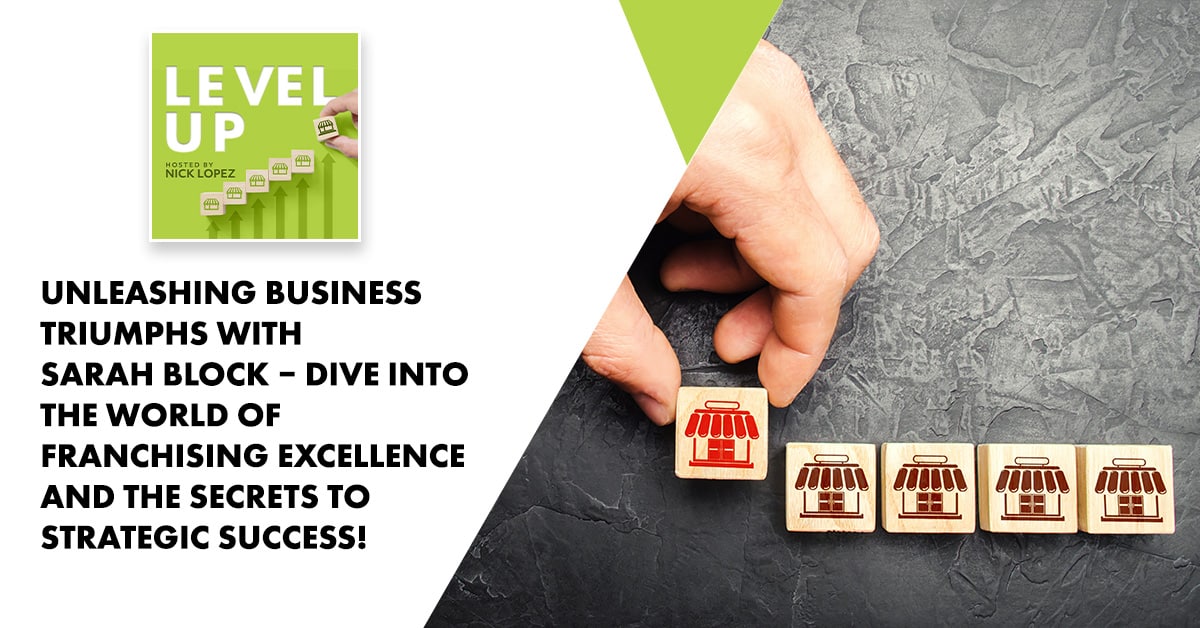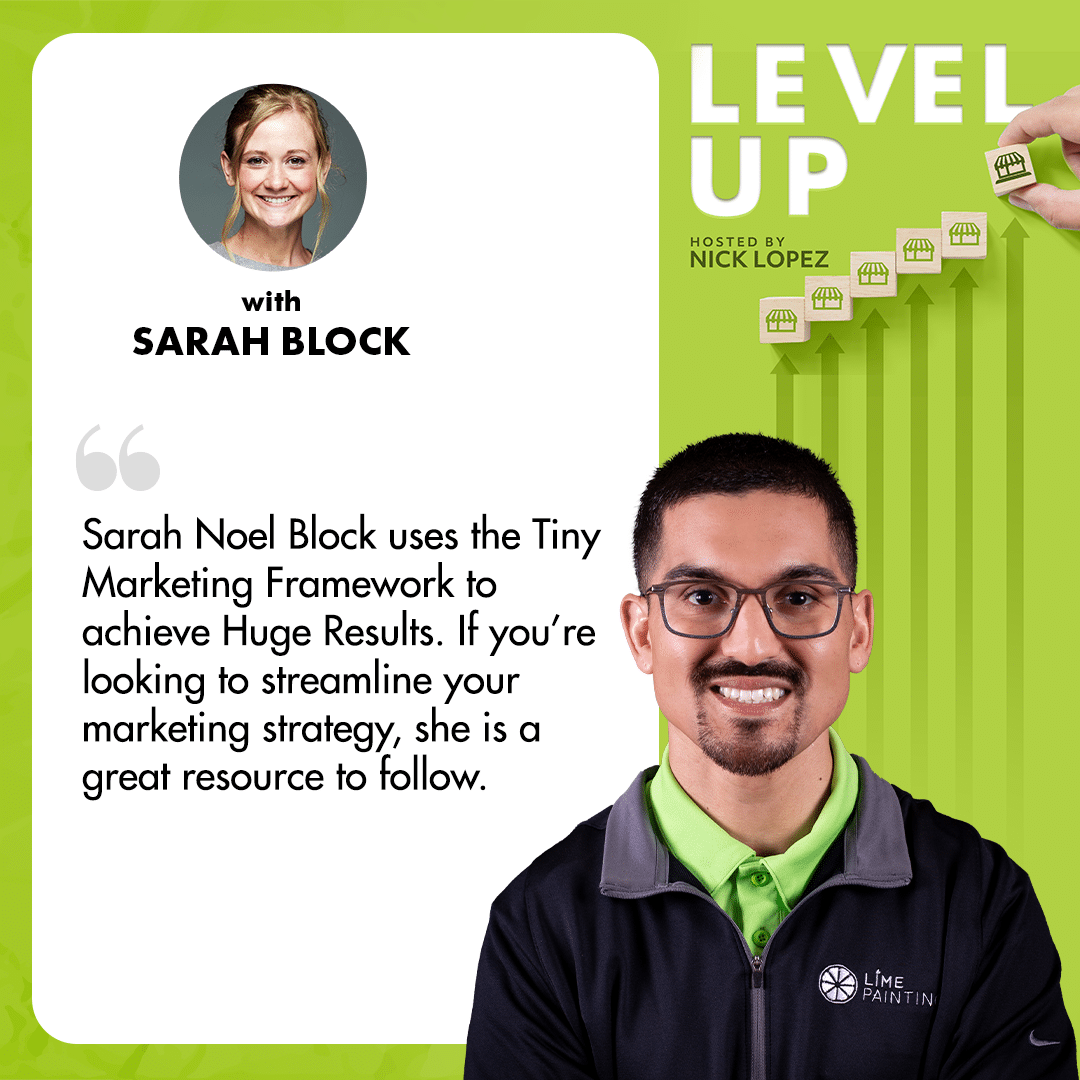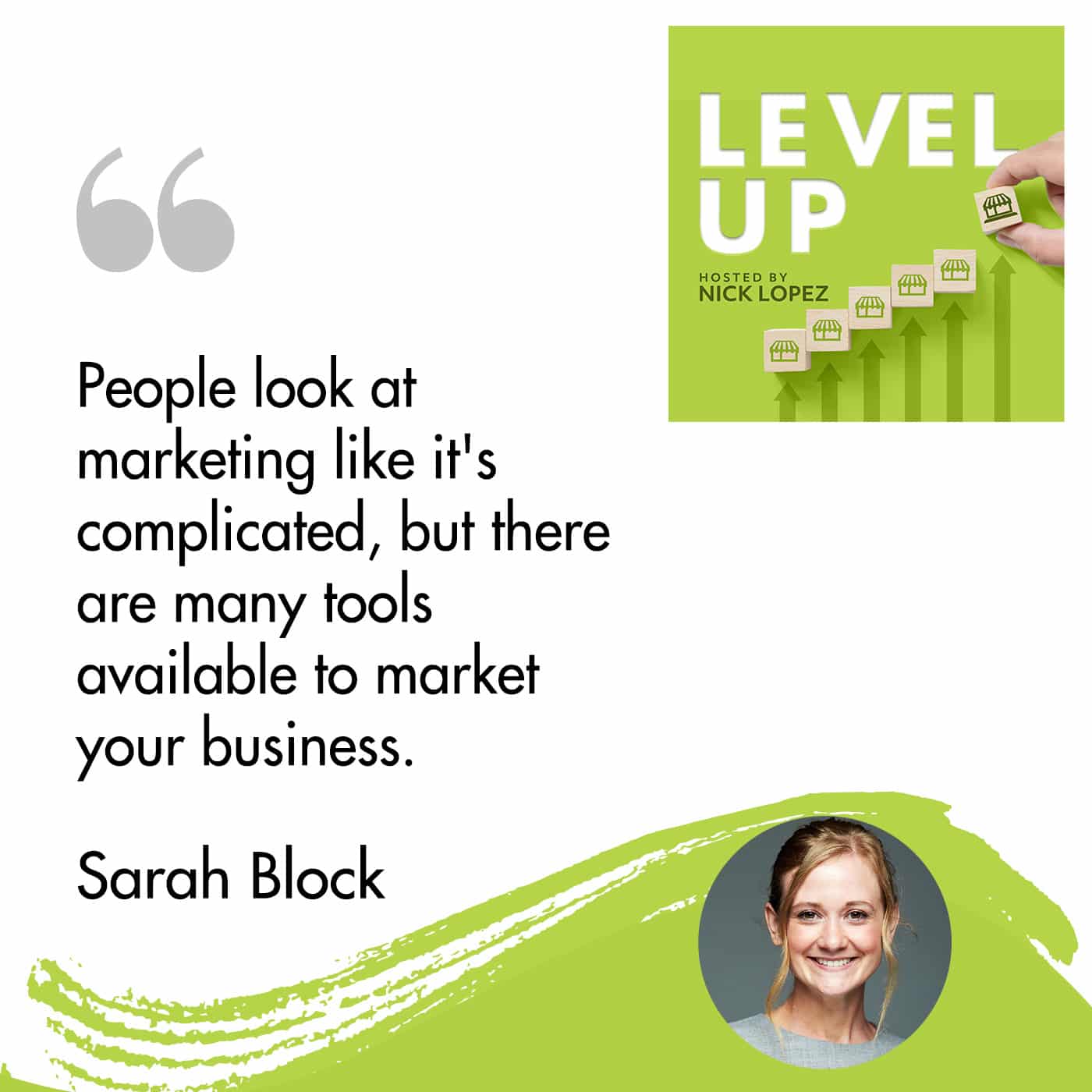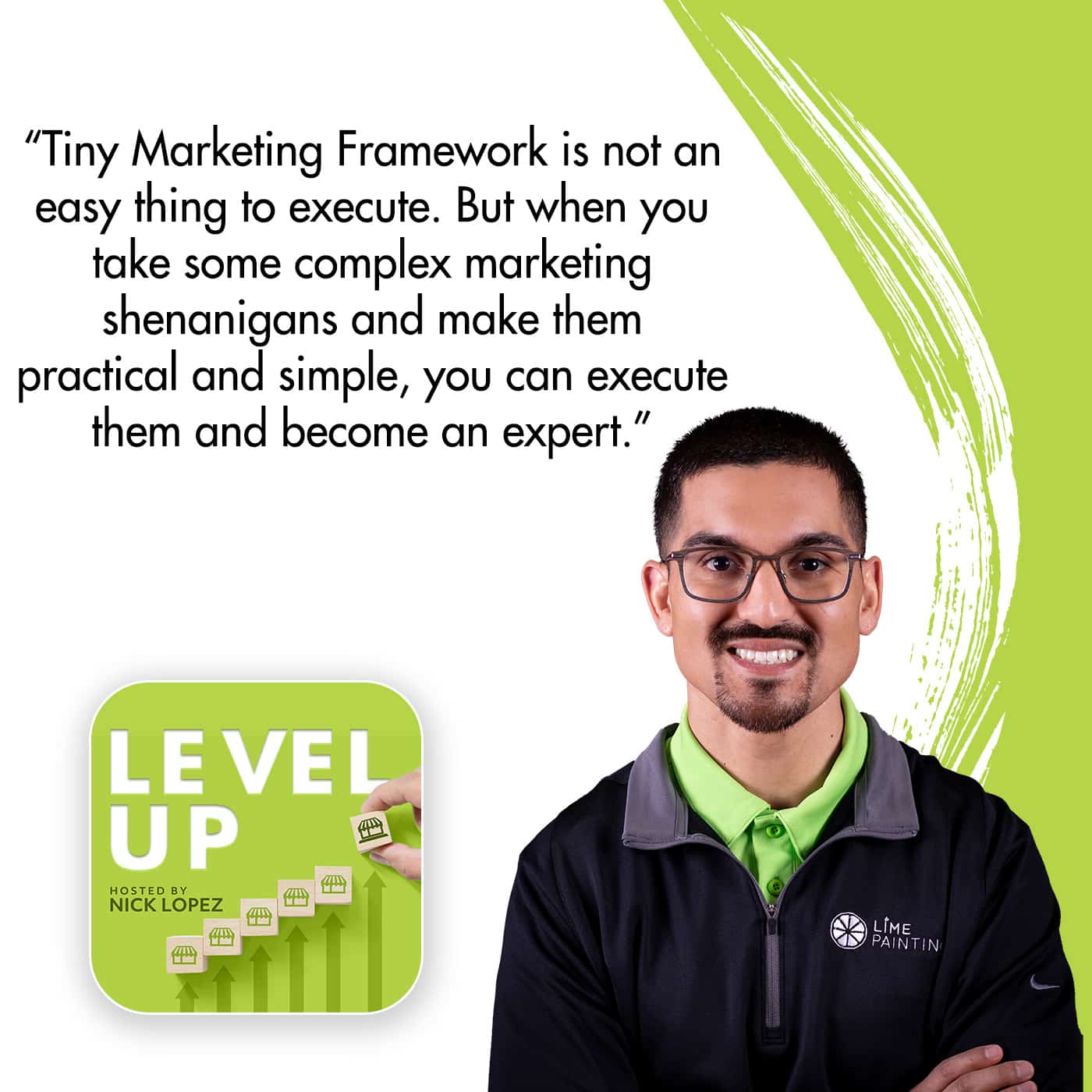
Sarah Noel Block is a professional specializing in assisting time-strapped marketers and business owners in building high-impact marketing strategies without the need to increase their headcount. She employs a tested and proven framework to streamline content marketing, social media, and email marketing through smart systems, offering a service called Tiny Marketing. In this episode, Sarah talks about her Tiny Marketing Framework and how it optimizes the marketing processes to achieve maximum impact with minimal resources. She also discusses the Project Management Tool to implement in your business. Her goal is to help these businesses market effectively and efficiently by concentrating on key priorities. So, hold on to your seats, and let’s ride with Sarah Noel Block as she takes us into this insightful episode today.
https://www.linkedin.com/in/sarahnoelblock
—
In this show, we have the absolute pleasure of learning from thought leaders in business, franchising, high performance, and personal development. Our guest for this episode goes without exception. She is the Founder of Tiny Marketing. Sarah Block, welcome to the show.
Thank you for having me. It’s a pleasure.
It’s a pleasure indeed. I am excited to dive in and share your talents and story. Let’s do it. Let’s dive in. When did you get started in marketing?
I started as a wee baby in 2008 working in building product marketing. I couldn’t get away from construction and buildings in general because I have lived a lot of life in construction building materials, real estate, and that kind of thing. I started at this place I won’t name but it was awful. Undisclosed. We don’t need to know. It’s the origin of my villain era.
I started in the marketing department of a seven-company group, which is the story you know about. That’s when I built out my system that came to become Tiny Marketing because I had seven presidents breathing down my neck saying, “We need to hit these goals,” and it was just me. I built up my system, the Tiny Marketing Framework, which is streamlined, systematized, automated AI, added AI, and then outsourced, anything that you can’t do internally. A lot of what we’re talking about is how to do that, how to utilize your internal resources, and then what you do when you don’t have them.

There is so much that could be said for that but what I love is that you started with humble beginnings.
Undisclosed and humble. I also got fired from that job. I’m extra humble. That was the crazy time.
I wish I was an employee I could say I got fired.
It was glorious walking out of there with that paper box and all my belongings. It was exactly how you see it in the movies.
You got to live that out in real life.
I did. Are you proud of me?
You are so fortunate.
That was the reason I ended up starting a business because I never again wanted to have one stream of income. I started freelancing after that on the side while working full-time as head of marketing roles corporate. In 2020, I started Tiny Marketing full-time and it’s done well.
The other part that I love is that when you standardized and created these processes that have created this incredible content machine, you can take an infrastructure from nothing and build a powerful marketing department.
That is where the right thrive of, “You have nothing. Let’s build this.”
That’s the world of franchising. I’m constantly in startup mode. I launching new entrepreneurs into our platform. I love all that. I won’t get on a tangent there. What I was going to say is that I also love the fact that you created this process from the ground up. You have this thing about hustle and grind.
I like to call it scrappy marketing where once you have a system in place, you can make it all work but when you have no team and a tiny budget, you have to be scrappy about it.
Do you have any idea what percentage of businesses out there are small businesses like doing 6 figures or maybe 7 figures but very entry 7 figures?
I have no idea what the numbers look like on that.
Do you think it’s the majority?
It’s the majority that is in that smaller realm, especially starting around the pandemic. Many people decided, “I’m going to do my thing. This is a great opportunity to start my business.” They’re probably right around there at the 3-year mark and the 6 or 7-figure spot.
They need to be scrappy.
They do. You don’t have a huge team like these other companies. One of my clients makes over $100 million but they still don’t have a marketing department. In so many companies, the last thing that they do is hire marketing. They’re living off of the backs of manual processes with a sales team doing cold outreach or business development having to be on top of building those relationships with potential customers.
It’s so time-intensive. They don’t have any idea that it will be so much easier with marketing because you’re building that know, like, and trust factor before anyone reaches out to you. The sales cycle is shorter. They don’t have to work as hard. They don’t have to hustle like they do now when they have marketing. Ninety percent of the time, it’s sales or business development that’s like, “Please Sarah, help me.”
I want to dive in and talk about what this process was like. You work for a holding company that owns seven different companies. It had zero people in marketing until there was Sarah. You are marketing for seven brands. I’ll let you tell the story but it became an award-winning marketing department that generates much content but started with a single person across seven brands.
It remained that way. I never had a team.
Thank you for saying that. I was trying to communicate that.
I heard the question in your voice, “Did it stay that way?” It did. It was just me. It was the framework that I built. It started with me being overwhelmed and sobbing in my cubicle because I was being pulled in too many directions. The presidents or the heads of those business units had ideas of what they wanted to do but none of them had marketing experience, strategy, or a reason why they thought that that would work and get them to accomplish their goals. We started with a strategy for each business unit.
I call it a strategic spark where I sit down with the stakeholders within the business unit and interview them. By the end of the interview, I understand what their challenges are and what goals they have for their business. I build out a strategy for them. It all happens within 90 minutes. That makes it so much easier. You get buy-in from the get-go because they’re involved. They approve it during that process. Everybody’s on the same page and then you move forward towards execution. That’s when you can start utilizing those things like systematizing, batching, templating, and coming up with core content that you can create regularly, repurposing it, and all that stuff.
Do you get buy-in from the team to support building out the marketing department before you talk to the decision-makers?
Are you referring to the subject matter expert thing that I talked about earlier?
Not quite, but I was curious. As you’re starting to implement this process, you want buy-in from the leadership from the decision maker. Are you working with the team to get it and then present that or is it directly? How does that work?
They are all involved. Decision-makers and any stakeholders have any buy-in on the project or the business unit. They’re all in the interview. They’re also all in there when I’m presenting it and what we call a magic hour. By the end, they all say yay or nay or give their advice on what they would want to change. Everything is done on the spot with everyone involved.
We have buy-in from every single person. In the end, we need that decision-maker to see that there are a lot of moving parts. There are a lot of people involved in every project. They need their buy-in. We need them but we also need the stakeholders to say, “I agree with this plan.” I’m going to be pulling them in. I’m going to need them to be subject matter experts and creators later on in the execution.
What do you think are the best ROI systems that you implement with a slim marketing focus or resources toward marketing?
The first thing I would invest in is a project management tool. You can have all of your projects in the same place and then templatize them. Those core pieces of marketing that you’re going to be creating on a consistent basis, have a template for it. You can automate it. The due dates are set up for you based on when you create it. It can automatically assign to the right people if you’re outsourcing anything to contractors or freelancers. That has a huge time savings. There’s mega ROI there. I would also add email marketing second for sure. You can’t mass-market your list without an email marketing platform. It’s not legal to do that. You want to do that and the money is made in the email.

How often is that overlooked?
Way more than I thought it would be. When I’m having these strategic spark sessions, I’m like, “You don’t have an email marketing platform. We got to do that. Are you sending emails from Gmail? That’s not legal.”
That’s a good low-hanging fruit.
It’ll make everything so much easier. I help a lot of companies. I’m like, “I’ll do the execution for you if you need me to,” but I’m also working with teams that want to do it internally, take the strategy I create, and have that done. I’ll help them set up the systems, figure out what tools they need, set up the automation so they don’t have to do any manual processes that can be done by a robot, find any AI that would make sense for them, and set that all up ahead of time so it’s smooth sailing. I don’t want to see anyone fail on my strategy.

You mentioned project management tools. What project management tools do you recommend?
I use Teamwork, which is robust. I started using that when my team got a little bit bigger and I needed more ability to use templates. There’s a CRM attached to it. There’s a chat so I can chat with my freelancers in there. It makes it so easy. When you’re first starting, Trello is super cheap. ClickUp works perfectly, and also Asana. I’ve worked in pretty much every project management tool. Any of them will work.
I love that you mentioned AI. That’s exactly where my mind was going around a lot of the project management systems that you implement and map out. If you’re doing it, you’re at such an advantage because of AI.
It makes it so much easier. Let’s say your core content is a show like this. You can use AI to turn this into a bajillion different things. You could use ToastyAI. Import your episode and it will create an article, your social media posts, a show notes page, and the highlights. You can use Opus AI. Take the Zoom video and turn that into Shorts, Reels, and TikTok. You can use Descript as an editor. They have a bunch of AI tools that can make it easier. I can never look at a camera but Descript has a tool that has the AI that makes it look like I’m looking at the camera. It’s all relatively inexpensive and makes it so much easier.
It’s a pretty nominal cost. What you can do marketing department-wise with a tiny budget is incredible.
A lot of us are on our own. 0 to 2-person marketing departments are my bread and butter where I like to work. They need to be as streamlined as possible and automate everything that they can. Many people who follow me or listen to my podcast, Tiny Marketing, are solo entrepreneurs. It’s them doing all of the client deliverables but also all of the work for their business. They need to be extra scrappy.
Do you do anything platform-wise that evaluates competition?
Do I have a tool that evaluates competition?
Competitive benchmarks on SEO.
SEMrush does that well if we’re talking SEO. AppSumo is a good way to check against your competitors. SparkToro is another nice one, which is by the same people as Maz but they can look at your competitor’s YouTube channels and see what other channels that their subscribers are looking at. That’s helpful also.
Are you recommending any BI tools?
I don’t have any.
It’s pulling all this together
There’s a tool Google has that you can pull in your analytics from a bunch of different places. You can do that if you’re trying to compile all the information together. You could use some like Zaps to pull it all together into a spreadsheet. You can get the information and import it from Zap into a spreadsheet. You can even import or automate with Zaps like ChatGPT if you want to look at sentiment comments from your social media channels and things like that.
Tell me more.
If you were to pull in comments from your social media accounts or let’s say your reviews from Google, you can create a Zap that connects that spreadsheet to ChatGPT requesting it to judge the sentiment of those reviews or comments.
That’s the tip of the iceberg. That’s all done with pretty economical tools. Going through an exercise, there are many ways to skin the cat. As a professional in the space, you’re thinking through, “Here’s this solution and that solution.” That’s the power of the marketplace and where technology is at. The good news is technology is compounding at an incredible rate. The speed at which it’s going to continue to increase is only going to be more exponential because of the advancement of technology where it’s at.
No joke. Every day, I get an alert that something I subscribe to has added new AI features. I’m the chronic beta tester where I need to go in and I need to play with it immediately.
I’ve been using ChatGPT so much as of late. I check it against thoughts. I don’t even know how I did business before.
We’ve become pretty reliant on it. It makes work so much faster. I interview many people, customers, the customers of my customers, and then people on my show. I take the transcripts, put them in ChatGPT, and then ask questions like, “Based on this transcript, what are their biggest challenges? What do they want their life to look like a year from now?” It makes it so much easier.
If you were to say that you had a superpower, what would you say that superpower is?
Making hard things easy.
What do you mean by that?
People look at marketing like it’s complicated. There are many tools available. There are many things you could do to market your business but I can have an hour-long conversation with you and I can tell you, “This is the easiest thing that you could do to get the results that you want. You don’t have to do all of these things because they’re available to you. These things will work.”

“For your particular situation in your business.”
Everybody has their team, resources, and tools. It’s always a customized situation but after having a conversation with them, it’s fairly easy for me to say, “This is the channel you should be on. This is the kind of content you should be producing. This is how often you should produce it. This is what your messaging should be if you want to attract your ideal customer.”
That’s dependent on each business. It’s going to be tailored and tweaked accordingly. Generally, where do you get started in that situation 0 to 2 folks on a team? What does that startup environment look like that you know you want to make sure, “We have this foundational?”
I start with the strategic spark where we talk to internal stakeholders and then I create that initial strategy going forward like, “What do we need to do to get you over those challenges and reach those goals?” I build out, “Where do we need to build a bigger and more robust strategy? How do we want execution to look like? What subject matter experts do you have in-house that are available to us to be able to bring them into the content creation so we can highlight them and help build that trust with your audience?”
The sneezes are important.
Every time you say sneeze, it makes me laugh. It makes me think of Captain Hook and me.
It takes me back to some leadership team projects where we had some fun using that word to represent subject matter experts. That’s getting that every business is different. Getting that vision for the opportunities, finding the gaps, and doing that collaboratively is key. If you were to give some recommendations, takeaways, or practical tips to make sure that the Tiny Marketing department has walls in as tip-top shape as possible, where would you point them in the marketing world? “Take a look here and there. Make sure you’re doing this.”
The first thing I would tell them to do is interview some of their favorite customers. Have those conversations. Find out what their customer journey looked like, what kind of content they like, what mediums they gravitate towards, what channels they use, and what triggered them to reach out to them in the first place. Having those customer conversations is eye-opening. It will guide everything else. That’s the first thing I always recommend, “Interview your customers.”

From there, build out a streamlined marketing strategy. Think, “If I only have one thing that I can do in each of these categories,” like content or messaging. What is the one thing that they care about? Email and all of that. Think one thing, one channel or medium. It becomes a lot easier. How can you streamline that as much as possible?
Start looking at tools that might do multiple things so you don’t have to worry about a huge tech debt. If you do have separate tools, how can you automate that? How can you connect to them? How can you bring AI? What would a batching schedule look like so you can get this done in a defined amount of time and focus on big projects that might come up later?
The process is paramount. Identifying your favorite customer in building for that customer obsessing around that customer is paramount but execution is paramount. That looks like getting started. Take complex and make it simple so you get started.
Set up a batching day and it will make it so much easier. If you know exactly what you need to create, block that day off and create a little marketing retreat day where you are in a hotel room or something and you guys bust out all of the content for that month. It gets a lot easier. You can make it fun if you create a little content party around it.
It should be fun. That’s what keeps you doing it 50 or 60 months down the road.
You need to enjoy it and your people need to love it.
You won’t always be simple and getting started. You’re going to have a lot of simple processes that ultimately make up what is hopefully an award-winning content machine, known as your marketing department but you need to get started.
You do. Choose one thing to do and then repurpose it for everything else.
You have done an incredible job of doing this with Tiny Marketing. Congratulations on that. That is to be celebrated. It is not an easy thing to execute but when you eat, sleep, and breathe it, take some complex marketing Shenanigans out there, and make it practical and simple, you can execute it over a long period and you become an expert.

I obsess over it so you don’t have to.
That is well said. Thank you for being on the show. I appreciate it.
Thanks for having me.
If folks want to get in touch with you, how can they do that?
They can go to SarahNoelBlock.com/levelup. There will be a URL where they can find everywhere I’m at. Go there. I hang out on LinkedIn if you want to go connect and be virtual friends.
We are level-up friends. You were very much on the theme for being on the show. Check out Sarah. Subscribe to the show. Give this a like and contribute to the conversation. Drop some thoughts down in the comments. As always, level up.

Sarah Noel Block. works with time-strapped marketers and business owners to build high-impact marketing without increasing headcount. she uses a tested and proven framework to streamline content marketing, so-cial media, and email marketing through smart systems. Optimize your marketing with Tiny Marketing.
She works with B2B entrepreneurs and small businesses with tiny (or nonexistent) marketing departments to help you market effectively and efficiently by focusing on only what matters.